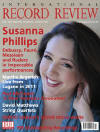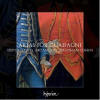Texte paru dans: / Appeared in:
*

International Record Review - (07-08/2012)
Pour
s'abonner / Subscription information
Hyperion
CDA67924

0034571179247 (ID236)
Consultez toutes les évaluations recensées pour ce cd
~~~~ Reach all the evaluations located for this CD
The sub-heading for this disc of arias associated with Gaetano Guadagni (1728-92) is ‘The first modern castrato’. In her note, Patricia Howard describes his voice as small and refined and comments on ‘his enthusiasm for immersing himself in a ‘character’ be it with Handel or as Gluck’s Orfeo, a mole which he sang for many years. The note adds that he ‘had so little taste for virtuosic display’, but the selection on the CD does include a few swift arias.
Tracks 1 to 4 contain the Handel choices, beginning with ‘O Lord, whose mercies numberless’ from Saul, a lovely piece. One is soon aware of what an excellent recording is provided and then of how seamlessly Iestyn Davies unfurls the long phrases, easing out an untrammelled line, as he also does in the slightly more decorative role of Hercules. Faced with the other Handel arias, Davies deals confidently with the more involved vocal part in ‘The raptur’d soul’ and sparkles through the rapid scalework of ‘Destructive war’ most impressively, causing one to wonder whether the remaindem of his programme will be so favourable. It is.
Certainly in the frisky ‘Se resto sul lido’ from Hasse’s opera the quickly uttered notes are delineated cleanly in the divisions a result of Davies’s polished technique rather than cheating with aspirates. The second aria from Didone abbandonata is a splendid martial affair with the brass giving extra strength: not a speedy bravura piece but one in which Aeneas is virtually singing his own praises in a strutting manner, projected manfully by Davies. (‘I am called to conquer by a noble thirst for honour.’)
One comes across too little of John Christopher Smith’s music, on record or in a live performance, so ‘Say, lovely Dream!’ from The Fairies, one of his two operas (the other is The Tempest), is most welcome. April Cantelo recorded two pieces from it on a L’Oiseau-Lyre LP, one of which was repeated by Anthony Rolfe Johnson on a Hyperion CD, but the present one is different. It is pleasingly lyrical but still demands flexibility, though at a slower tempo than some of the numbers here. On occasions, I have been critical of a certain preciosity in Davies’s enunciation, but this is sung naturally: no overstressing.
Like Orfeo, Telemaco was written by Gluck for Guadagni. The aria here is a sorrowful one, sung with full tone. With the next two arias we are on more familiar ground. The role of Orfeo has been recorded by countertenor, mezzo/contralto and even baritone. There has been argument over whether the role written for a castrato is better served today by a woman or by a male alto or countertenor (I am referring to the Italian version of the opera). Within each group there have been disparate voices: Forrester, Bumbry, von Otter among the ladies; Kowalski and Daniels on the male side. Davies’s tender rendition of ‘Che puro ciel!’ feels apposite to Orfeo’s thoughts in the search for Euridice. ‘Che farò’ is rescued from the ponderous progress often found from oversized orchestras. Arcangelo‘s playing is lighter in colour and in touch but not shallow. Davies sings with dignity.
The da capo of ‘Che farò’ is not decorated, probably in accordance with Gluck’s intention to reform opera. That for the vengeance aria from Arne’s Alfred does draw from Davies some small embellishments in what is an aria of rising and dipping vocal flights, to which he adds security of production. One piece remains. ‘Pensa a serbarmi’ was written by Guadagni for insertion into either Guglielmi’s Ezio or Bertoni’s composition of the same story. It is an elegant solo which benefits from the dulcified tone that Davies supplies against an orchestral contribution in which the sounds of the flute are sweet to the ear.
This is a well-filled disc, but the Bach sinfonia and Gluck’s ballet occupy over 12 minutes. It is a personal matter, but I should have preferred that amount of time on a CD entitled ‘Arias for Guadagni’ to have been devoted to, well, arias for Guadagni, of which there are many more. The Sinfonia opens with an Allegro di molto movement, with woodwind instruments peeping out from the strings, and closes with a shorter Presto, all played with zest by Arcangelo under Jonathan Cohen’s direction.
I think that if I had to nominate a CD to represent Iestyn Davies this one would be my choice. It offers a wide selection, full of delights, to attract lovers of eighteenth century music who are not averse to the countertenor voice and even anybody who is.
Cliquez l'un ou l'autre
bouton pour découvrir bien d'autres critiques de CD
Click either button for many other reviews


